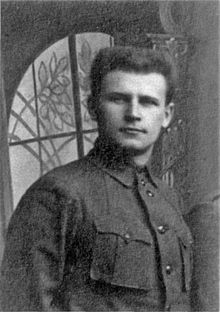Kastuś Jezavitaŭ
Kastuś Jezavitaŭ | |
|---|---|
Кастусь Езавітаў | |
 | |
| Born | November 17, 1893 Dźvinsk, [Vitebsk Governorate] (nowadays Daugavpils in Latvia) |
| Died | May 23, 1946 (aged 52) |
| Occupation | political and military leader within the Belarusian independence movement |
| Organization | the Rada of the Belarusian Democratic Republic; the Belarusian Central Council |
Kastuś Jezavitaŭ (also known as Kanstantyn Jezavitau (Ezavitaŭ), Belarusian: Кастусь Езавітаў; 17 November 1893 - 23 May 1946) was a political and military leader within the Belarusian independence movement of the early 20th century.
| Wikimedia Commons has media related to Kanstancin Jezavitaŭ. |
Early years[]
Jezavitaŭ was born into the family of a military officer in the city of Dźvinsk, Viciebsk Province of the Russian Empire (nowadays Daugavpils in Latvia).[1][2]
He studied in Dźvinsk and graduated from the Viciebsk Teachers' Institute. Jezavitaŭ then completed the Pavlovsk Military College in St. Petersburg in 1916.[1][2][3]
Involvement in the Belarusian independence movement[]
Jezavitaŭ became involved in the in 1913 by joining the Belarusian Socialist Assembly (Hramada).[1][2]
After the February Revolution, he began to organize Belarusian groups among soldiers of the Russian Imperial Army and joined the Belarusian Military Council. He took active part in the First All-Belarusian Congress, was arrested by the Bolshevik secret police Cheka but managed to escape.[1][2][3]
After the retreat of the Red Army, Jezavitaŭ became the Belarusian commander of the city of Minsk when the Belarusian administration took power on 19 February 1918. He was elected to the provisional Belarusian Government in February 1918 and was involved in the declaration of independence of the Belarusian Democratic Republic on 25 March 1918.[1][2]
From 1918 to 1920 Jezavitaŭ served the Rada of the Belarusian Democratic Republic in various capacities first as Minister of Defence and then as a military attaché in newly independent Latvia and Estonia. He also established diplomatic relations with the governments of Lithuania and Finland, sought military assistance from the government of the United States and was instrumental in securing diplomatic recognition of the Belarusian Democratic Republic by the Baltic states and Finland.[2][4][5]
Later life[]
After the defeat of the Belarusian independence movement by the Red Army, Jezavitaŭ went into exile and settled in his native Dźvinsk (which became part of Latvia pursuant to the 1920 Latvian-Soviet Peace Treaty and was renamed Daugavpils) where he lived until 1944. He organised a number of Belarusian schools and organisations within the local Belarusian community and edited several Belarusian periodicals in Latvia.[1][2]
In 1944 Jezavitaŭ joined the Belarusian Central Council in Minsk and was appointed its Defence Minister.[1][2]
Death[]
Jezavitaŭ was captured by the Soviet intelligence SMERSH in 1945. He died in incarceration in Minsk on 23 May 1946. The official causes of his death were tuberculosis and dystrophy but some sources believe that he was executed.[1][2][3][4]
References[]
- ^ Jump up to: a b c d e f g h "Jezavitaŭ Kanstantyn". www.slounik.org. Retrieved 2021-08-03.
- ^ Jump up to: a b c d e f g h i "Кастусь Езавітаў" [Kastuś Jezavitaŭ]. Рада Беларускай Народнай Рэспублікі / Rada of the Belarusian Democratic Republic (in Belarusian). Retrieved 2021-08-03.
- ^ Jump up to: a b c Маракоў, Леанід. "Рэпрэсаваныя лiтаратары, навукоўцы, работнiкi асветы, грамадскiя i культурныя дзеячы Беларусi. 1794-1991. Езавітаў Кастусь" [Repressed writers, scientists, educators, public and cultural figures of Belarus. 1794-1991. Kastuś Jezavitaŭ, by Leanid Marakou]. www.marakou.by. Retrieved 2021-08-03.
- ^ Jump up to: a b "Імёны Свабоды: Кастусь Езавітаў" [The Names of Freedom : Kastuś Jezavitaŭ]. Радыё Свабода / Radio Free Europe/Radio Liberty (in Belarusian). Retrieved 2021-08-03.
- ^ Арлоў, Уладзімер (2020). ІМЁНЫ СВАБОДЫ (Бібліятэка Свабоды. ХХІ стагодзьдзе.) [Uładzimir Arłou. The Names of Freedom (The Library of Freedom. ХХІ century.)] (PDF) (in Belarusian) (4-е выд., дап. ed.). Радыё Свабодная Эўропа / Радыё Свабода - Radio Free Europe/Radio Liberty. pp. 228–229.
- 1893 births
- 1946 deaths
- Belarusian independence movement
- Members of the Belarusian Central Council
- Members of the Rada of the Belarusian Democratic Republic